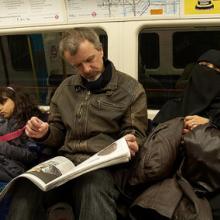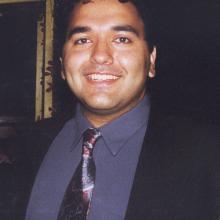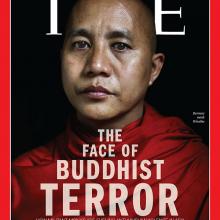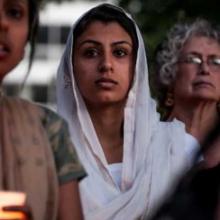Muslim
The Supreme Court of India is weighing whether yoga has a religious element, as it decides if public schools may teach the ancient discipline in the country where it originated.
India’s school policy considers yoga an integral component of physical education. But the court has expressed caution, and is considering arguments that yoga has a religious component. The issue is complicated because India is a secular democracy but has pockets of Hindu nationals who would like to force their way of life on others.
“Can we be asking all the schools to have one period for yoga classes every day when certain minority institutions may have reservations against it?” the court asked Oct. 18, referring to Christian and Muslim groups.
A coalition of 125 religious, civil rights, and community-based organizations sent a letter to the U.S. Department of Justice Thursday urging a civil rights investigation into a New York City Police Department program that spies on Muslims.
Groups from several faith traditions signed the letter including the Presbyterian Church (USA), the National Council of Jewish Women, the Hindu American Foundation, and the Sikh Coalition. Civil rights groups include the Leadership Conference on Civil and Human Rights, the NAACP, the American Civil Liberties Union, South Asian Americans Leading Together, and the National Network for Arab American Communities.
The NYPD program is already the target of two federal lawsuits, one filed in June by the ACLU and the City University of New York Law School’s Center for Law Enforcement Accountability and Responsibility, and the other filed in June 2012, by several Muslim plaintiffs represented by Muslim Advocates and the law firm Bhalla and Cho.
American Jews say they face discrimination in the U.S., but they see Muslims, gays, and blacks facing far more.
This and other findings from the recently released Pew Research Center’s landmark study on Jewish Americans help make the case that Jews — once unwelcome in many a neighborhood, universitym, and golf club — now find themselves an accepted minority.
“While there are still issues, American Jews live in a country where they feel they are full citizens,” said Kenneth Jacobson, deputy national director of the Anti-Defamation League, which was founded in 1913 to combat anti-Semitism.
Sojourners supports the National Religious Campaign Against Torture (NRCAT). NRCAT recently released five Youtube videos to counter the claims found in pop-culture that torture is acceptable. Check out this video of people of faith speaking to core faith values that underlie their anti-torture work,, which features Sojourners' Lisa Sharon Harper.
At an interfaith summer camp in northern New Jersey, two dozen children explored a swamp to learn how creatures depend on safe water.
In Southern California, a Unitarian Universalist congregation installed a dry well so water from its church rooftops drains into underground pipes to replenish the water table.
In Vermont, members of a Lutheran church removed cars and appliances that had been dumped in a nearby stream and restored its banks with local willows and oaks.
Across the country, water has become more than a ritual element used in Christian baptismal rites or in Jewish and Muslim cleansing ceremonies. It has become a focus for worshippers seeking to go beyond water’s ritual symbolism and think more deeply about their relationship to this life-giving resource.
Islamophobic or empowering? Those are among the reactions to a new Diesel jeans ad featuring a heavily tattooed, topless white woman wearing a redesigned, denim burqa.
The slogan next to her: “I Am Not What I Appear To Be.”
Racist and condescending are among the criticisms that have been leveled at the ad, created by Nicola Formichetti, former stylist to Lady Gaga, who made waves last month with her song “Burqa.” But others, including a female Muslim marketing consultant who advised Diesel, said the idea was to make people question assumptions and stereotypes.
A senior judge, leading members of Parliament, and human rights activists are calling for an urgent debate on the explosive issue of whether Muslim women should be allowed to wear veils when they testify in court.
The call for national debate follows Judge Peter Murphy’s Sept. 16 ruling that a 22-year-old Muslim woman standing trial on charges of intimidating a witness at a north London mosque must remove her facial veil, called a niqab, when testifying so the jury can better evaluate her facial expressions.
If she refuses, the woman — known only as Defendant D — could face a prison sentence for contempt of court.
After hardline Islamists voiced opposition to the Miss World contest now being staged in Muslim-majority Indonesia, a rival World Muslimah beauty contest exclusively for Muslim women will announce its winner on Wednesday in the capital of Jakarta, though the U.S. candidate suddenly dropped out.
“Muslimah World is a beauty pageant, but the requirements are very different from Miss World,” the pageant’s founder Eka Shanti told Agence France-Presse.
“You have to be pious, be a positive role model and show how you balance a life of spirituality in today’s modernized world,” she said.
Muslim stand-up comedy is nothing new. But what makes “The Muslims Are Coming” different is that it portrays what happens when a troupe of comedians performs before red state Americans in such places as Tennessee, Georgia, Alabama, Mississippi, Florida, Arizona, Utah and Idaho.
The documentary by Negin Farsad, an Iranian-American, and Dean Obeidallah, of Palestinian-Italian roots, opened in Chicago yesterday.
A federal judge ruled Monday that the Abercrombie and Fitch clothing chain violated federal anti-employment discrimination guidelines when it fired a Muslim employee in 2010 for not removing her religious headscarf, or hijab, for work.
Abercrombie asserted that as part of its business plan, it not only employed sales-floor personnel, but “models,” had a “look policy” that gave employees certain grooming and appearance guidelines, and sought to give customers an “in-store experience.”
Umme-Hani Khan wore her headscarf when she interviewed at Abercrombie’s store in San Mateo, Calif. Khan said she accepted the “look policy,” which included a no headgear provision, and in October 2009 started her new job, which was mainly in the stockroom, but required her one to four times per shift to restock clothes on the sales floor.
It’s been five years now that Talat Hamdani has been able to talk about her son without crying, but she still prefers mostly not to tell his story.
“It’s all over the Internet,” she said.
She’s stopped talking about how she initially didn’t worry when her son, Mohammad Salman Hamdani, who was a cadet with the New York City Police Department, didn’t answer his cellphone that night; about how police questioned her and her husband when authorities couldn’t find their son’s body, to see if he had any terrorist connections; about the New York Post headline a month after the attacks — “Missing – Or Hiding? – Mystery Of NYPD Cadet From Pakistan,” that cast him as a suspect in the 9/11 attacks.
North Carolina became the seventh state to prohibit its judges from considering Islamic law after Gov. Pat McCrory allowed the bill to become law without formally signing it.
McCory, a Republican, called the law “unnecessary,” but declined to veto it. The bill became law on Sunday.
The state joins Arizona, Kansas, Louisiana, Oklahoma, South Dakota, and Tennessee.
Supporters hailed the bill as an important safeguard that protects the American legal system from foreign laws that are incompatible with the U.S. Constitution, while critics argued that the bill’s only purpose is to whip-up anti Muslim hatred because the Constitution already overrides foreign laws.
Upon my recent return from the Middle East (with The Global Immersion Project), I was struck more than ever before at our Western infatuation around military aggression, violence, and division. Not only are these the primary narratives we are fed through our major media outlets, they are the narratives we subconsciously embrace through the latest bestseller, box office hit, or video game. Violence, death, and division have become normative. We are becoming numb to the very things that we – as ambassadors of hope and reconciliation – are to turn from as Resurrection People. It is as though there is a stranglehold on our on our ability to see and participate in the stories of healing and new life.
As surprising as this may be, embedded in the midst of these conflicts are endless stories of hope that never make the latest headline or sound bite. And in the times I've followed Jesus INTO these places of conflict, I continue to encounter stories of peace and hope that embody the Gospel message, stories by real people, happening right now, in places usually known only for conflict, violence, and death.
Last night, my wife Janny and I had the honor of sharing a table with a gathering of local Muslims for an Iftar meal. It is currently Ramadan, which means the Muslim community around the globe fasts everyday day from sunrise to sunset. No food. No water. No tobacco. No sex. Each night they have a celebration feast to break their daily fast called the Iftar meal. It is sacred, joyous, and a time to sit with those they love to worship the One they love, Allah (which is simply the Arabic translation of God).
It was into that sacred gathering that they expanded the table and pulled up a seat for us and a few other Christian and political leaders throughout San Diego. Their hope was simply to create space in their daily practice for their neighbors to experience life with them. They were both acknowledging city leaders who have been proactive in creating an environment of dignity and mutual relationship, and creating a space for new/renewed understanding of one another. Acknowledging our core faith differences, they made clear that it should in no way detract from our ability to share a common vision for the good of our city. We are neighbors who live, work, and play on the same streets with a common desire to see deep, charitable relationships, sustainable economy, and mutual understanding and a celebration of diversity.
As I often say, as followers of Jesus, we have no choice but to move toward relationships with those who are marginalized, dehumanized, and in need of love. We don’t compromise our faith by hanging out with people we may or may not agree with. No, in fact, we reflect the very best of our faith.
A radical Buddhist monk in Myanmar said a bomb that exploded near him, wounding five devotees, came after a death threat by a “Muslim religious leader” who wanted to silence his campaign to prevent Buddhist women from marrying Muslim men.
Ashin Wirathu’s portrait appeared on the July 1 cover of Time magazine’s Asia edition, above the headline, “The Face of Buddhist Terror: How Militant Monks are Fueling Anti-Muslim Violence in Asia.”
“Since their plan to fight me via Time Magazine has failed, they are now targeting my ‘dharma’ [Buddhist teaching] events, and the devotees, with explosive devices,” Wirathu told the respected Irrawaddy magazine.
North Carolina lawmakers on Wednesday approved a bill to prohibit judges from considering “foreign laws” in their decisions, but nearly everyone agrees that “foreign laws” really means Shariah, or Islamic law.
North Carolina now joins six other states — Oklahoma, Arizona, Kansas, Louisiana, South Dakota, and Tennessee — to pass a “foreign laws” bill. A similar bill passed in Missouri, but Gov. Jay Nixon vetoed it, citing threats to international adoptions.
The bills all cite “foreign laws” because two federal courts have ruled that singling out Shariah — as Oklahoma voters originally did in 2010 — is unconstitutional.
SALT LAKE CITY — Every day. For a month. From sunup to sundown. No food. No water.
No sweat?
No, plenty of sweat, especially this year.
With Utahns baking under energy-sapping, forehead-dripping, water-chugging temperatures, the state’s Muslims are swearing off that liquid life force during the heat of the day — and the morning, and the evening.
The annual 30-day fast known as Ramadan, one of Islam’s five pillars, began Tuesday and requires that believers forgo food and drink. At this time of year, that means 15 hours of parched throats and unquenched thirst.
Gay Americans are much less religious than the general U.S. population, and about 3-in-10 of them say they have felt unwelcome in a house of worship, a new study shows.
The Pew Research Center’s study, released Thursday, details how gay, lesbian, bisexual, and transgender Americans view many of the country’s prominent faiths: in a word, unfriendly.
The vast majority said Islam (84 percent); the Mormon church (83 percent); the Roman Catholic Church (79 percent); and evangelical churches (73 percent) were unfriendly. Jews and nonevangelical Protestants drew a more mixed reaction, with more than 40 percent considering them either unfriendly or neutral about gays and lesbians.
For Raed Jarrar, the FBI’s decision Wednesday to begin tracking hate crimes against Arabs is a battle won in a larger war.
“This is just one part of fixing the system, because unfortunately many hate crimes against Arab Americans have not been noticed,” said Jarrar, spokesman for the American-Arab Anti-Discrimination Committee.
In addition to its decision on tracking anti-Arab hate crimes, the FBI has agreed to track crimes against a number of religious groups it has never before tracked. The new categories include reporting crimes committed against Buddhists, Hindus, Sikhs, Mormons, Jehovah’s Witnesses, and Orthodox Christians.
Missouri Gov. Jay Nixon has vetoed a bill that would have made his state the seventh in the nation to prohibit judges from considering Shariah, or Islamic law, and other “foreign laws” in their decisions.
But rather than citing the usual arguments about anti-Muslim discrimination and the freedom of religion, Nixon introduced a new argument against such legislation, asserting it would make it harder for Missouri families to adopt children from overseas.
Nixon said if state judges would not be able to consider foreign decrees that are sometimes required to finalize adoptions, adoptive families and children would be left stranded.


















